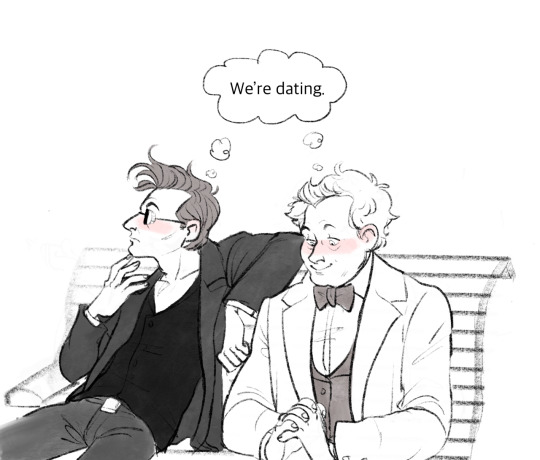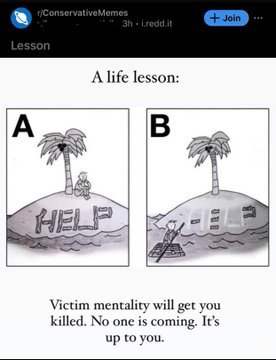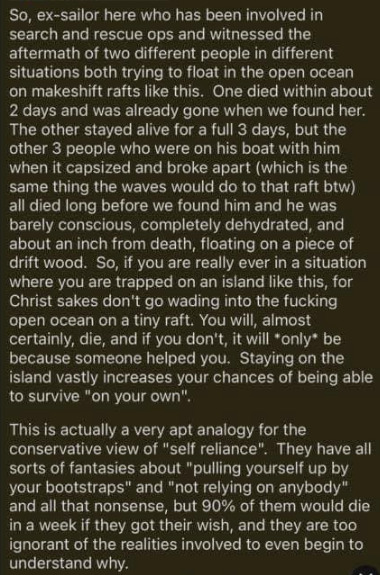Text
"Brave" by sara bareilles but crowley saying it to aziraphale
Some highlights:
“you can turn a phrase into a weapon or a drug”
“everybody's been stared down by the enemy, fallen for the fear and done some disappearing, bowed down to the mighty”
"nothing's gonna hurt you the way that words do"
"maybe there's a way out of the cage where you live"
Also:
"Innocence, your history of silence, won't do you any good..."
And:
"'You can be the outcast, or be the backlash of somebody's lack of love...or, you can start speaking up."
#good omens#crowley#aziraphale#sara bareilles#i mean i'm certain someone has commented on this before or made a fanvid or smth but this is just hitting me now so#at this point i might as well just paste the whole song lol#this does seem a little anti-aziraphale-working-for-heaven which i'm not entirely on board with but these are crowleys words not mine
1 note
·
View note
Text
the show got so many things on point but one thing we tragically did not get to see is the snakeskin "shoes" Crowley was "presumably wearing" he's not wearing shoes guys it's his feet anyway I'm sad we missed that fashion choice
22 notes
·
View notes
Text
Notes on the Scene in Job's Basement
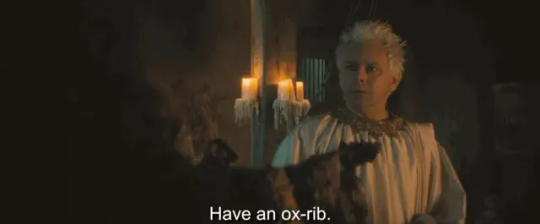
Crowley is not tempting Aziraphale here. He's experimenting on him.
Getting Aziraphale to sin, or even getting him drunk, is not Crowley's intent in this scene. Eating food, taking pleasure in food, drinking alcohol, and even being drunk are not sins in most of Judaism or Christianity (and they're certainly not sins in British Christianity, regardless of any church's doctrine). When Aziraphale turns down alcohol, Crowley just suggests he try food instead; so it's not important to Crowley what Aziraphale tries, but it is important to him that he try something.
This scene is also the first time (chronologically) we see that Crowley likes to drink and likes to be drunk.
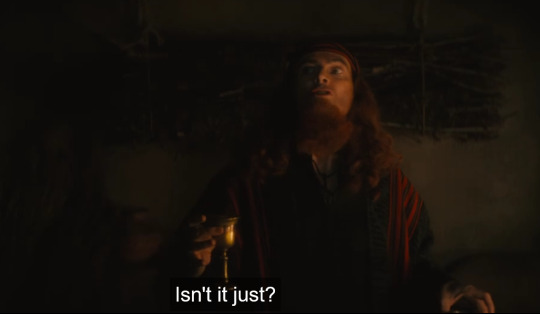
We know from
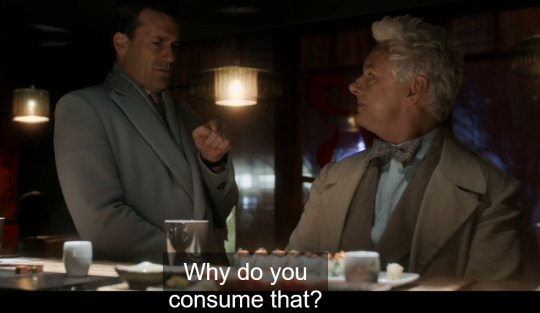
and from
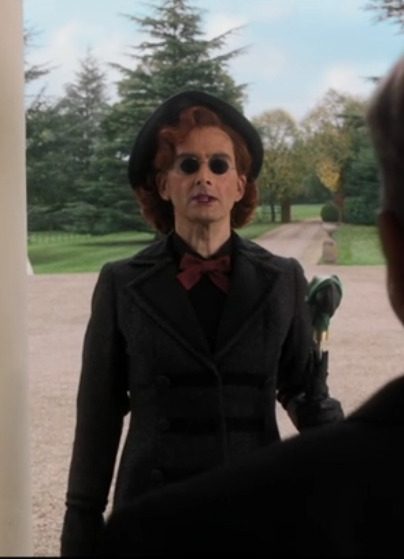

as well as from Book Omens and Word of God that angels have no instinct beyond curiosity pulling them toward eating or toward gender. From this we can reasonably presume they have no instinct toward Beverages either.
That means that in this moment--
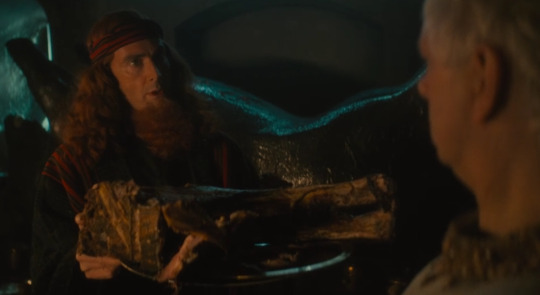
--Crowley is very likely the only metaphysical entity he knows on either side of the divide, or even knows of, who has ever experienced a physical pleasure.
And he probably has some Lingering Questions about it, like we all did the first time a physical pleasure blew our minds. Like,
Is it this strong for everyone?
Is there something wrong with me?
Am I going to hurt myself if I do this, like, a lot?
And it's not like the poor creature can ask anyone, because the answers for humans aren't necessarily going to apply to him.
So when he sees an opportunity, Crowley gets that one angel he knows who'll talk to him to try a human thing, and then he watches to see if physical pleasure hits the angel as hard as it hit him.
And that's why he looks so creepily pleased when it does.
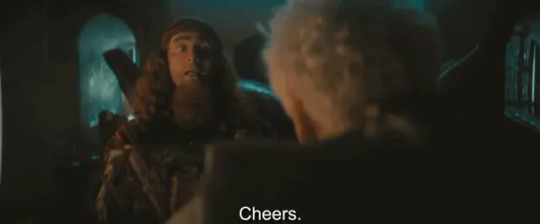
Apparently it is this strong for everyone and there isn't anything wrong with him. Now he can relax and get sloshed without worrying, and he even has someone to talk to about how rad human stuff is.
A Dip Into Speculation
We know because we're shown this isn't the first time Crowley has gotten drunk that, watching Aziraphale, Crowley understands what he's seeing. I think it's really interesting that Crowley doesn't laugh at Aziraphale at any point during this scene, and he doesn't correct the way he's eating, either.
Maybe it's because this is what it was like for Crowley the first time. Maybe he got so drunk he passed out and woke up in a puddle of his own sick. Maybe he got so drunk he passed out and didn't wake up at all, and there was Paperwork and he had to get used to a whole new corporation just when he'd got the hang of having legs in the old one. Maybe somebody had to show him how to use a fork or whatever they had going on for eating utensils in Ancient Mesopotamia. I distinctly remember having to learn as a small child to chew with my mouth closed. There's a distinct possibility Crowley doesn't consider the way Aziraphale is eating to be worthy of ridicule because whatever Crowley did the first time was worse.
Maybe he wants to leave Aziraphale set up for later embarrassment over his table manners. Aziraphale was a judgy bitch about the wine.
Or maybe it's something like Let him have this one. There can be rules to it later; let him just enjoy it, once, like a little kid with both fists in their birthday cake.
Maybe it's desire. There is some textual evidence for this. Once Aziraphale learns to eat properly, the way he does it is very attractive, and we know Crowley loves watching him do it.
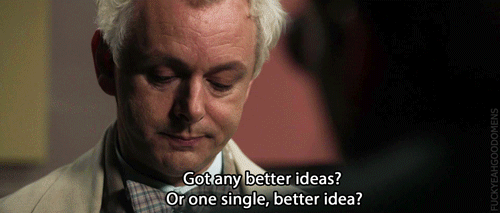
I don't think it's overreaching even to interpret David Tennant's physical performance of Crowley watching Aziraphale eat as one of sensual or erotic pleasure. I mean--
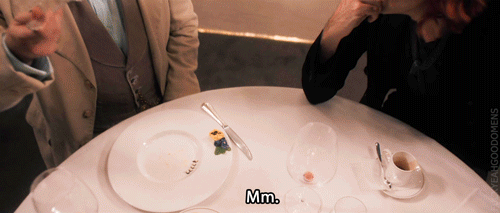
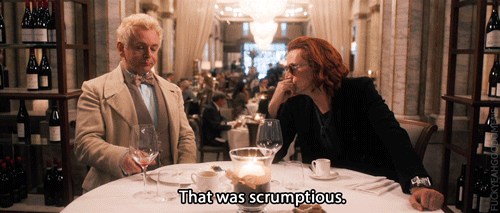
I'm not saying it absolutely has to be erotic, but it's not a reach, or even a full extension of the elbow, to read it that way.
There's another meta somewhere [I'll link it when I find it again; if you know this meta, please drop it in comments!] that discusses how this exchange in Job's basement is filmed like an erotic scene.
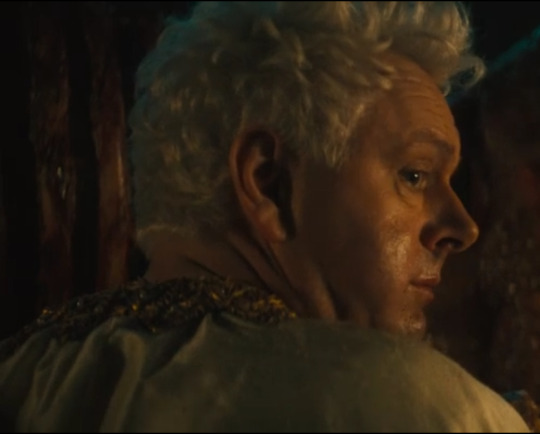
Like Crowley, we all want to kiss this face.
Aziraphale isn't eating prettily, but he's eating lewdly, ravenously, desirously, and it's lit like romantic sex, not like gluttony. Whether that's funny or poignant or hot may depend on the viewer. Here's how Crowley's handling it:
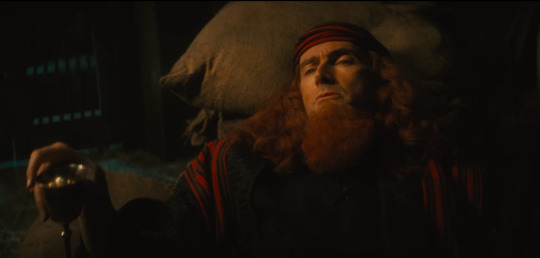
Srs tho, any frame of this scene could have been painted by Artemisia Gentileschi.
Or maybe--and this is my favorite of the available interpretations--maybe this is what it was like for Crowley the first time and he doesn't interfere because he wants Aziraphale to come out of this as someone who's had the same experience Crowley's had so Crowley won't be so totally alone in having had it.
1K notes
·
View notes
Text
All of this, yes. And also with regards to #1, I think that for Crowley is far more terrified by any threat to Aziraphale when he is not present and therefore can't do anything about it. He doesn't know what he will do about it, but he has a lot of faith (rightfully so) in his ability to improvise. He'll do something. So when he is next to Aziraphale and there is a threat, it's not that he isn't scared, it's just not the same helpless terror.
Things that still don't make sense to me:
1. Crowley's mad drive back to Aziraphale after he learns about the Book of Life threat vs. "Michael is threatening to remove Aziraphale from the Book of Life on the spot? I'll just have a nap here in the armchair while they are at it".
2. Crowley's "AAAAAAA GABRIEL!!!" vs. "The Metatron asks you to go out with him? Whatever. I'll muse on our late breakfast then. Oh, you are back? Listen to what I just learned from the lesbians".
3. The permanent change of the sunglasses from episode 3 on.
4. Me still trying to find sense in the show about two eldritch horrors who like to play all sorts of dramatic scenarios of their own devising seemingly just to make their love life spicier.
452 notes
·
View notes
Text
The other week I was at lunch with some friends who have a very adorable toddler and I suddenly realized what Aziraphale reminded me of in the scene where he tries the ox ribs. His face and his reactions are exactly those of a baby trying food for the first time. People have used many metaphors and descriptions of his expression and response but that’s the one that really jumps out at me.
There’s that moment where the baby clearly has no clue what is happening in their mouth, a reminder to onlookers that eating involves a really weird set of sensations that we tend not to think about once we’ve been doing it for a while. Then they adjust enough to actually pay attention to the taste and texture, and if it’s good their face absolutely lights up.
That’s what we see in Aziraphale’s expression- instinctive disgust at the weirdness of how it feels until he processes the actual sensations, and then he is sold. The sudden shift from repulsion to confusion to surprise shifting to a very clear “more”…to me it couldn’t be any clearer.
It’s one of the reasons I think the scene makes me so uncomfortable - because it’s so innocent and so violent at the same time (part of the visceral sense of violence, I think, comes from the fact that it is meat he’s eating). It’s an act of defiance, a step further into the human world, but it’s one that Aziraphale isn’t fully aware of, I don’t think. Innocent aggression. He loses control and stops thinking, gets sucked into the moment in a way characteristic of children. It’s almost a Cookie Monster moment.
#Aziraphale#good omens#good omens season 2#good omens meta#food#i think that scene was so awesome and important but did it make anyone else viscerally uncomfortable?#still unpacking why#as has been said previously God is a carnivore
119 notes
·
View notes
Text
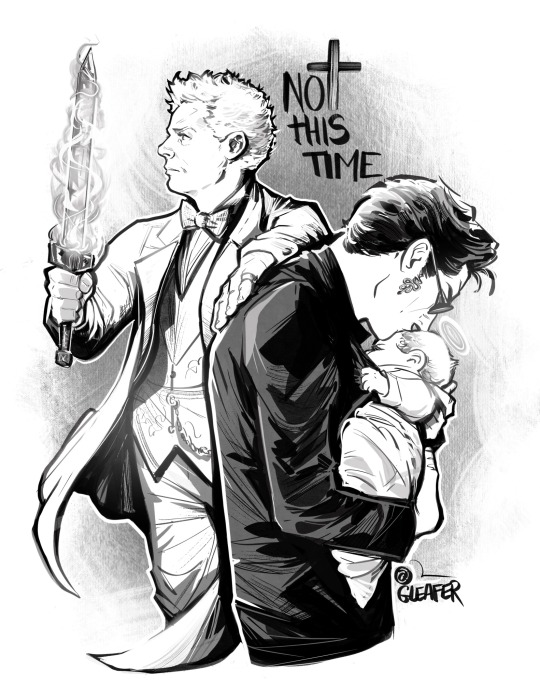
Hello Tumblr! First post ever. I’m an illustrator living in the Chicago western suburbs who is currently suffering from a severe case of Good Omens obsession. So I’ll be sharing my artwork here!
“Not This Time”
Fanfic art of how I imagine the “second coming”!
13K notes
·
View notes
Text
one of my favorite parts of modern Jewish prayer services is that at many of them there are parts that get sung by the congregation to very catchy tunes, and sometimes small children who are in the room will start spontaneously dancing. This is generally encouraged, and often their grown-ups will start dancing with them. Rabbis think it's great. I saw this happen at one of the most intense parts of Yom Kippur services this year and it was magical
#judaism#prayer#shul#yom kippur#of course most our catchiest tunes are in minor key#that's just how we roll#the kids are usually there because they want to be there/want to be with their adult#in my experience there is almost always some form of childcare/babysitting or “groups” where kids can go play instead if they want
17 notes
·
View notes
Text
"The thing is, he himself is eminently temptable" - the truest words ever spoken about Aziraphale
Oh, I totally forgot that the book gives us an actual year that Crowley and Aziraphale start their Arrangement, but it's 1020 which fits in with the show's timeline too. It makes me smile to think about. Aziraphale pretends to be scandalised by Crowley suggesting they cover for each other but by the time we see them in the Globe Theatre, they've been doing this for almost 600 years.
#good omens#aziraphale#crowley#“eminently temptable” that is so good i feel like that must have been in the book even though I know it wasn't#weaponized temptability
5K notes
·
View notes
Text
so after watching all 3 seasons of Broadchurch and adding Alec Hardy to my blorbo list, I’m starting to imitate his phone-call vibe when I talk on though phone, which if you have seen the show, you will know is probably not a good thing
#alec hardy#at least I don’t pick up the phone and answer “what”#He sounds like he is half asleep every time and I don’t know why I find this funny#broadchurch
15 notes
·
View notes
Text
How people imagine life as a superhero with a disability:
Wow, sure is nice to have Magic Spidey Senses so my visual impairment doesn’t affect me in any way!
Thanks to my Powers of Flight, accessible infrastructure is totally unnecessary for me!
My Super Speed has canceled out my executive function disorder!
What it would actually be like:
“I just don’t understand, if you can save our city every week then why is filling out a form so difficult?”
#disability#accessibility#adhd#superhero#disabled characters#disabled superheroes idk if that’s a tag but it should be#I am so here for that story#we get a wee bit of it with some characters it’s true#but I want more of it
2 notes
·
View notes
Text
Awhile ago @ouidamforeman made this post:
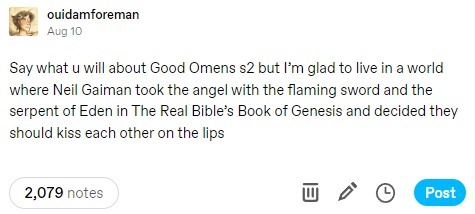
This shot through my brain like a chain of firecrackers, so, without derailing the original post, I have some THOUGHTS to add about why this concept is not only hilarious (because it is), but also...
It. It kind of fucks. Severely.
And in a delightfully Pratchett-y way, I'd dare to suggest.
I'll explain:
As inferred above, both Crowley AND Aziraphale have canonical Biblical counterparts. Not by name, no, but by function.
Crowley, of course, is the serpent of Eden.
(note on the serpent of Eden: In Genesis 3:1-15, at least, the serpent is not identified as anything other than a serpent, albeit one that can talk. Later, it will be variously interpreted as a traitorous agent of Hell, as a demon, as a guise of Satan himself, etc. In Good Omens --as a slinky ginger who walks funny)
Lesser known, at least so far as I can tell, is the flaming sword. It, too, appears in Genesis 3, in the very last line:
"So he drove out the man; and placed at the east of the garden of Eden Cherubims, and a flaming sword which turned every way, to keep the way of the tree of life."
--Genesis 3:24, KJV
Thanks to translation ambiguity, there is some debate concerning the nature of the flaming sword --is it a divine weapon given unto one of the Cherubim (if so, why only one)? Or is it an independent entity, which takes the form of a sword (as other angelic beings take the form of wheels and such)? For our purposes, I don't think the distinction matters. The guard at the gate of Eden, whether an angel wielding the sword or an angel who IS the sword, is Aziraphale.
(note on the flaming sword: in some traditions --Eastern Orthodox, for example-- it is held that upon Christ's death and resurrection, the flaming sword gave up it's post and vanished from Eden for good. By these sensibilities, the removal of the sword signifies the redemption and salvation of man.
...Put a pin in that. We're coming back to it.)
So, we have our pair. The Serpent and the Sword, introduced at the beginning and the end (ha) of the very same chapter of Genesis.
But here's the important bit, the bit that's not immediately obvious, the bit that nonetheless encapsulates one of the central themes, if not THE central theme, of Good Omens:
The Sword was never intended to guard Eden while Adam and Eve were still in it.
Do you understand?
The Sword's function was never to protect them. It doesn't even appear until after they've already fallen. No... it was to usher Adam and Eve from the garden, and then keep them out. It was a threat. It was a punishment.
The flaming sword was given to be used against them.
So. Again. We have our pair. The Serpent and the Sword: the inception and the consequence of original sin, personified. They are the one-two punch that launches mankind from paradise, after Hell lures it to destruction and Heaven condemns it for being destroyed. Which is to say that despite being, supposedly, hereditary enemies on two different sides of a celestial cold war, they are actually unified by one purpose, one pivotal role to play in the Divine Plan: completely fucking humanity over.
That's how it's supposed to go. It is written.
...But, in Good Omens, they're not just the Serpent and the Sword.
They're Crowley and Aziraphale.
(author begins to go insane from emotion under the cut)
In Good Omens, humanity is handed it's salvation (pin!) scarcely half an hour after losing it. Instead of looming over God's empty garden, the sword protects a very sad, very scared and very pregnant girl. And no, not because a blameless martyr suffered and died for the privilege, either.
It was just that she'd had such a bad day. And there were vicious animals out there. And Aziraphale worried she would be cold.
...I need to impress upon you how much this is NOT just a matter of being careless with company property. With this one act of kindness, Aziraphale is undermining the whole entire POINT of the expulsion from Eden. God Herself confronts him about it, and he lies. To God.
And the Serpent--
(Crowley, that is, who wonders what's so bad about knowing the difference between good and evil anyway; who thinks that maybe he did a GOOD thing when he tempted Eve with the apple; who objects that God is over-reacting to a first offense; who knows what it is to fall but not what it is to be comforted after the fact...)
--just goes ahead and falls in love with him about it.
As for Crowley --I barely need to explain him, right? People have been making the 'didn't the serpent actually do us a solid?' argument for centuries. But if I'm going to quote one of them, it may as well be the one Neil Gaiman wrote ficlet about:
"If the account given in Genesis is really true, ought we not, after all, to thank this serpent? He was the first schoolmaster, the first advocate of learning, the first enemy of ignorance, the first to whisper in human ears the sacred word liberty, the creator of ambition, the author of modesty, of inquiry, of doubt, of investigation, of progress and of civilization."
--Robert G. Ingersoll
The first to ask questions.
Even beyond flattering literary interpretation, we know that Crowley is, so often, discreetly running damage control on the machinations of Heaven and Hell. When he can get away with it. Occasionally, when he can't (1827).
And Aziraphale loves him for it, too. Loves him back.
And so this romance plays out over millennia, where they fall in love with each other but also the world, because of each other and because of the world. But it begins in Eden. Where, instead of acting as the first Earthly example of Divine/Diabolical collusion and callousness--
(other examples --the flood; the bet with Satan; the back channels; the exchange of Holy Water and Hellfire; and on and on...)
--they refuse. Without even necessarily knowing they're doing it, they just refuse. Refuse to trivialize human life, and refuse to hate each other.
To write a story about the Serpent and the Sword falling in love is to write a story about transgression.
Not just in the sense that they are a demon and an angel, and it's ~forbidden. That's part of it, yeah, but the greater part of it is that they are THIS demon and angel, in particular. From The Real Bible's Book of Genesis, in the chapter where man falls.
It's the sort of thing you write and laugh. And then you look at it. And you think. And then you frown, and you sit up a little straighter. And you think.
And then you keep writing.
And what emerges hits you like a goddamn truck.
(...A lot of Pratchett reads that way. I believe Gaiman when he says Pratchett would have been happy with the romance, by the way. I really really do).
It's a story about transgression, about love as transgression. They break the rules by loving each other, by loving creation, and by rejecting the hatred and hypocrisy that would have triangulated them as a unified blow against humanity, before humanity had even really got started. And yeah, hell, it's a queer romance too, just to really drive the point home (oh, that!!! THAT!!!)
...I could spend a long time wildly gesturing at this and never be satisfied. Instead of watching me do that (I'll spare you), please look at this gif:
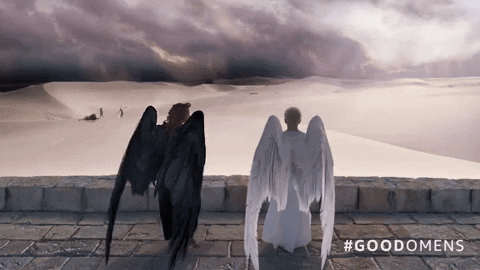
I love this shot so much.
Look at Eve and Crowley moving, at the same time in the same direction, towards their respective wielders of the flaming sword. Adam reaches out and takes her hand; Aziraphale reaches out and covers him with a wing.
You know what a shot like that establishes? Likeness. Commonality. Kinship.
"Our side" was never just Crowley and Aziraphale. Crowley says as much at the end of season 1 ("--all of us against all of them."). From the beginning, "our side" was Crowley, Aziraphale, and every single human being. Lately that's around 8 billion, but once upon a time it was just two other people. Another couple. The primeval mother and father.
But Adam and Eve die, eventually. Humanity grows without them. It's Crowley and Aziraphale who remain, and who protect it. Who...oversee it's upbringing.
Godfathers. Sort of.
26K notes
·
View notes
Text
also as a singer, shoutout to michael sheen's vocal range. I'm not actually talking about singing i haven't really heard him sing so idk...no, I'm talking about his speaking pitch range.
he played House on Doctor Who. I repeat he played House, a character with a voice like a freakin thundercloud, or possibly the depths of night. I did not notice this until I saw this information somewhere, even though I literally just watched that episode after watching GO2. But I can hear it if I listen closely.
this is also the man who said "it's not as fun" as Aziraphale in a voice pitched like a child.
bravo sir
21 notes
·
View notes
Text
shoutout to Aziraphale's glorious little pause when Nina asks him if they will be discussing christmas lights at the shopkeepers' meeting because she has Things To Say.
you can practically SEE him doing some quick mental calculus to decide if the correct answer is "yes" or "no," hedging his bets, and going with yes. love it
#aziraphale#aziraphale good omens#it's the little things#good omens season 2 spoilers#but not big ones i don't think#excellent work on the part of mr sheen over there#ineffable husbands#acting
18 notes
·
View notes
Text
I would never have wanted Aziraphale to go to Heaven in theory, but because he chose to, I am convinced it is absolutely necessary
Thinking about Heaven and Hell and how Heaven has vastly more resources at its disposal. When Hell wants to spy on Aziraphale and Crowley they have to send an actual demon Upstairs with a physical camera and zombie henchmen to take one (1) picture. When Heaven does it they can effortlessly pull receipts on all of human history without leaving the C-suite.
And that’s by design, isn’t it? Because Heaven is not the good side, they’re the victors. They won the war. They kept the executive floors, literally and metaphorically, and Hell got kicked down to the crappy basement.
Hell is defined by scarce resources and the behaviors an environment of scarcity produces. It’s shitty and dark and crowded; everything is old and broken and frustrating to use. Scarcity engenders infighting, scrabbling for resources because there isn’t enough to go around, backstabbing and deal-cutting and shoving down anyone weaker than you to get a slightly better position. Taking out your anger over your shit conditions and what you lost on human souls and on other demons alike. Demons are crabs in a bucket, constantly pulling each other down. (And, like the crab metaphor, their situation is manufactured. Crabs do not naturally occur in buckets. Someone put them there.)
We see that Gabriel, separated from the memory of his power and privilege in Heaven, is not fundamentally an asshole. The assholery is instilled by the system he lives in. In the same way, we don’t really know what any of the demons would be like outside the system of Hell. Beelzebub experienced the most modest amount of friendly camaraderie and understanding and decided it was worth risking everything for. Crowley, who has spent the most time outside the environment of Hell of any of them, is not vicious and cruel toward humans the way we see many of the other demons being. And it’s not because he’s special; it’s because he’s been able to spend time in an environment where his compassion and kindness and admiration for humans can breathe a little when no one is watching.
I highly suspect that the structure of Heaven and Hell and their current relationship to Earth and humanity (and Aziraphale and Crowley) is not going to survive s3 intact. There is simply no way for Aziraphale and Crowley and Earth to be safe and free from metaphysical threats with the system the way it is now.
There are several ways I could see this resolving, but the most metaphorically rich and theologically bananapants option would be…something that permanently heals the rift between Heaven and Hell.
Not undoing the Fall so that it never happened. That can’t be done on a societal level any more than on an individual one. The war still happened; the damage was still done. But some kind of mutually agreed disarmament. A radical redistribution of ethereal resources. Taking down the metaphysical border wall. Unrestricted fraternization between demons and angels who are really more alike than they are different. Maybe abandoning the executive floors and the basement entirely, and meeting…somewhere in the middle.
792 notes
·
View notes
Text
and very, very often, self care is not plants and ice rollers and fluffy blankets of peace.
it’s standing over your kitchen sink and crying while doing the dishes because you just want to go back to bed but the dishes need done. and you don’t know why you’re crying but you're trusting you need it. and you aren’t listening to the music that pulls you into a spiral; you’re listening to some cheerful shit your friend sent you. it’s getting up and staring at your fridge and closing your eyes and then cooking yourself food even though you hate it and it’s miserable. because you know that you’d cook for your friend, and you are trying to befriend yourself. it’s dragging yourself into the shower because you know you’ll feel better afterwards. it’s doing mundane tasks with patience, cursing under your breath, trying desperately to give yourself grace. grace is the beginning of care. care is the beginning of love.
we think it’s supposed to be peace and yet the most powerful self care moments are when we hate everything but especially ourselves. and life does not feel worth the loving.
to look into that pain and yet choose to care for yourself in however many pieces you are — that is care. love. grace. trust. belief. it hurts because it’s love where there was no love before. it heals because it believes there will be love, one day, soon.
34K notes
·
View notes


